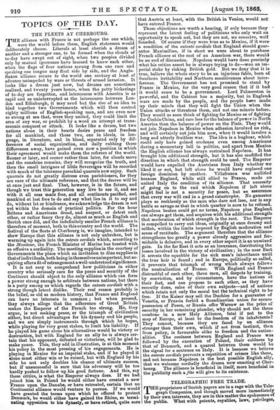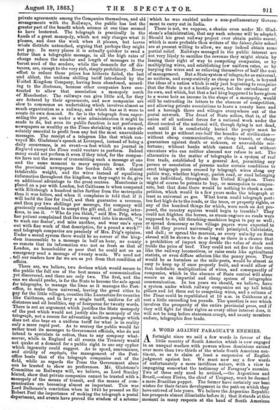TELEGRAPHIC FREE TRIBE.
THE proprietors of Scotch papers are in a rage with the Tele- graph Companies, and though moved more immediately by their own interests, they are in this matter the spokesmen of the public. What with patents, royalties, laws, privileges, private agreements among the Companies themselves, and old arrangements with the Railways, the public has lost the greater part of the benefit which science at one time seemed to have bestowed. The telegraph is practically in the hands of a great monopoly, which not only charges what it pleases' and does the work when it pleases, but leaves whole districts untouched, arguing that perhaps they might not pay. In many places it is actually quicker to send a letter than a telegraphic message, in all the high rates of charge reduce the number and length of messages to the barest need of the senders, while the demands for off dis- tances, are, except to the very rich, simply prohibitory. Every effort to reduce these prices has hitherto failed, the last and ablest, the uniform shilling tariff introduced by the Uuited Kingdom Company, having been abandoned, accord- ing to the Scotsman, because other companies have con- tracted to allow that association a monopoly north of Manchester. The railways can give little aid, for they are fettered by their agreements, and new companies are slow to commence an undertaking which involves almost as much organization as a railway, and which has as it were to create its own demand. So far is the telegraph from super- seding the post, as under a wise administration it might be made to do, but even its public function is not performed, newspapers as wealthy as the Times shrinking with a care ab- solutely essential to profit from any but the most unavoidable messages. The receipt of a telegram like that which con- veyed Mr. Gladstone's speech at Liverpool, instead of being a daily occurrence, is an event—a feat which no journal in England except the Times could venture to perform. Indeed many could not perform it even if they tried, for the compan- ies have not the means of transmitting such a message at one and the same moment to many separate firms. Upon the provincial newspapers the burden falls with almost intolerable weight, and the wires instead of equalizing information throughout the kingdom' as they ought to do, give an additional advantage to the great centres. Manchester is placed on a par with London, but Caithness is when compared with Edinburgh a hundred miles further from the metropolis than it was before, and when it complains is told that if it will build the line for itself, and then guarantee a revenue, and then pay two shillings per message, the company will graciously condescend to accept the gift and, if nothing inter- feres, to use it. "Who do you think," said Mrs. Prig, when her patient complained that the soap went into his mouth, "is to wash one &Mar', and miss another, and wear one's eyes out with fine work of that description, for a pound a week?" and telegraph companies are precisely of Mrs. Prig's opinion. Under a sound system there would be no corner of the king- dom inaccessible to a message in half an hour, no county eo remote that its information was not as fresh as that of London, no householder so poor that he could not on an emergency send a message of twenty words. We need not . tell our readers how far we are as yet from that condition of affairs.
There are, we believe, two devices which would secure to the public the full use of the best means of communication yet discovered, and there are only two. The first, and the one we should prefer, is for the State to become the sole agent for telegraphs, to manage the lines as it manages the Post- office, to make them universal, leaving the great cities to pay for the little villages, counties like Lancashire for counties like Caithness, and to levy a single tariff, uniform for all distances and all localities, say of fourpence for twenty words. There is not an argument which justifies the State monopoly of the post which would not justify also its monopoly of the telegraph, not a reason for advocating uniform postage which does not also bear on a uniform tariff for what is in reality only a more rapid post. As to secrecy the public would far nether trust its messages to Government officials, who do not intend to speculate in cotton, than to any company what- soever, while in England at all events the Treasury would not quake at a demand for a public right to use any cypher which ingenuity could suggest. As to speed, convenience, and civility of employis, the management of the Post- office beats that of the telegraph companies out of the field, while as regards the Press the Government alone 'can be trusted to show no preferences. Mr. Gladstone's Committee on Railways will, we believe, as Lord Stanley hinted, show that private companies cannot be trusted with a monopoly of the means of transit, and the means of com- munication are becoming almost as important. This was Lord Dalhousie's conviction when in 1845 he pressed on Sir Robert Peel the importance of making the telegraph a postal department, and events have proved the wisdom of a scheme
which he was enabled under a non-parliamentary Govern- ment to carry out in India. There is not, we suppose, a chance even under Mr. Glad- stone's administration, that any such scheme will be adopted. Should his great railway project ever obtain public assent, which is more probable than writers of the laissez-faire school are at present willing to allow, we may indeed obtain some partial relief. Railways managed in the public interest are not very likely to sacrifice the revenue they might obtain by leasing their right of way to competing companies, or by multiplying wires, and establishing low uniform rates, or by burying the wires and so relieving themselves of half the cost of management. But a State system of telegraphs as universal, as uniform, and comparatively as cheap as the post, is beyond the ideas of a nation which is only just beginning to recognize that the State is not a hostile power, but the embodiment of its own, and which, but that a bad king happened to have given to a worse heir an income in the shape of a monopoly, would still be entrusting its letters to the chances of competition, and allowing private associations to leave a county here and and a borough there and villages everywhere out of the postal network. The dread of State action, that is, of the union of all national forces for a national work under the direct control of the national will, though dying is not dead, and until it is comfortably buried the people must be content to go without one-half the benefits of civilization— without cheap communication, or cheap transit, or cheap guarantees against death or sickness, or unavoidable mis- fortune; without banks which cannot fail, and without executors who can neither abscond nor refuse to act. The alternative in the matter of telegraphs is a system of real free trade, established by a general let, permitting any person or association of persons under certain conditions to erect telegraph posts crossed by telegraph wires along any public way, whether highway, parish road, or road belonging to an individual, throughout the United Kingdom. There might of course be patents to buy, or monopolies to compen- sate, but that done there would be nothing to check a com- petition, which would in a few years make the telegraph at least as universal as gas. What harm could telegraph posts ten feet high do to the roads, or the trees, or property rights, or any of the hundred things for which, were such an Act pro- posed, the country squires would begin to tremble ? They could not frighten the horses, as steam-engines on roads were supposed to do, till thrashing-machines began to pay so well; or spread democracy as the village papers were expected to do till they proved universally well principled, Calvinistic, and dull; or spread the murrain, as every unlucky ox from abroad will be shown to do as long as there is a chance that a prohibition of import may double the value of stock and treble the price of beef. They could not set fire to the corn like the railway locomotives, or raise rents like agricultural statists, or even diffuse atheism like the penny press. They would be as harmless as the mile-posts, would be almost as easy to keep up if once properly built, and would allow of that indefinite multiplication of wires, and consequently of companies, which in the absence of State control will alone secure us an impartial and cheap system of telegraphic communication. In ten years we should, we believe, have a system under which railway companies set up tall brick pillars and let them out to competing wires, and a column of the Times could be republished at 10 a.m. in Caithness at a cost a little exceeding ten pounds. The question is one which involves the prosperity of the entire provincial press, and if they will fight for their rights as every other interest does, it will not be long before statesmen accept, and county members endure, telegraphic free trade.































 Previous page
Previous page